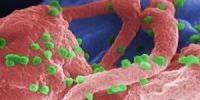Gut Microorganisms Drives HIV Infection Method
Basic intestinal microorganisms influence the HIV virus' attack plan against the immune system, according to a study published in Cell Host & Microbe.

Basic intestinal microorganisms influence the HIV virus’ attack plan against the immune system, according to a study published in Cell Host & Microbe.
The study, conducted by researchers at the Duke Human Vaccine Institute, builds upon previous research that determined the primary neutralizing antibodies are powerless against the virus.
These antibodies are believed to attack the HIV virus’ gp41 outer casing, which quickly transforms and avoids neutralization. Furthermore, the investigators found gut microbiota plays a factor in this process.
“The gp41 commensal bacterial antigen cross-reactive antibodies originate in the intestine, and the gp41 Env response in HIV-1 infection can be derived from a preinfection memory B cell pool triggered by commensal bacteria that cross-react with Env,” the researchers wrote.
Gut microbiota, are responsible for immune system development and immune cell deployment. However, their new findings show this microbiota also reacts with the HIV virus, said the study’s senior author Barton F. Haynes, MD, who is director at the Duke Human Vaccine Institute.
“Remarkably, a majority (82%) of the ileum anti-gp41 antibodies cross-reacted with commensal bacteria, and of those, 43% showed non-HIV-1 antigen polyreactivity,” the authors reported.
Haynes also commented that naïve B cells are dispatched when an infection enters and replicates within the gastrointestinal tract. However, this does not occur in the case of the HIV virus. Instead, memory B cells are called to the gut because HIV mimics familiar bacterial antigens.
“The B cells see the virus and take off — they make all these antibodies, but they aren’t protective, because they are targeted to non-protective regions of the virus envelope,” Haynes said.
Investigators confirmed their findings by observing HIV negative individuals for gp41-gut flora antibodies and intestinal bacterium cross-reactions.
“This supports the notion that the dominant HIV antibody response is influenced by previously activated memory B cells that are present before HIV infection and are cross-reactive with intestinal bacteria,” lead author Ashley M. Trama said.
Based on their findings, the researchers believe their discovery could assist with their subsequent examinations for an effective vaccine.